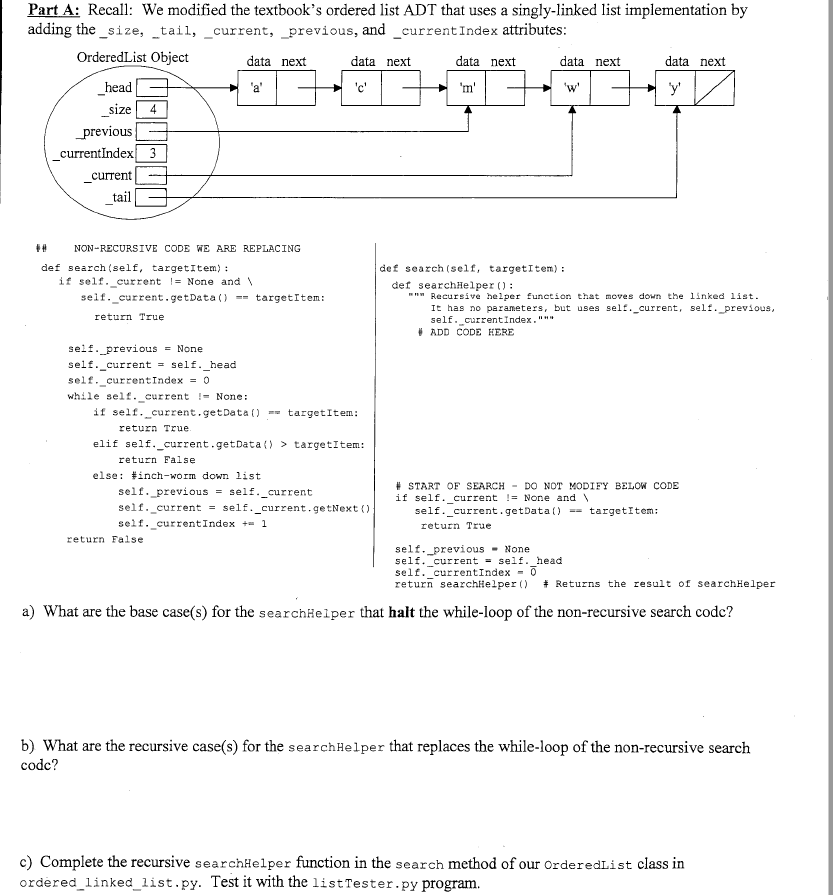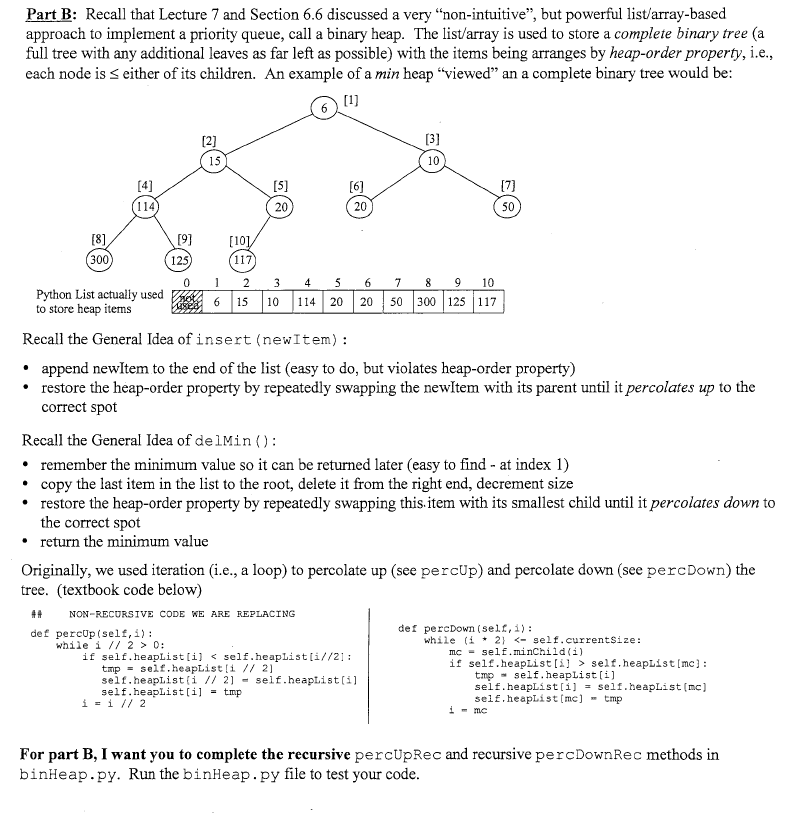Question: USE PYTHON for the following questions. And the end of this page I have posted tjo codes to work with for the questions. Here are
USE PYTHON for the following questions. And the end of this page I have posted tjo codes to work with for the questions.


Here are the codes:
binheap.py
import unittest
# this heap takes key value pairs, we will assume that the keys are integers
class BinHeap:
def __init__(self):
self.heapList = [0]
self.currentSize = 0
def buildHeap(self,alist):
i = len(alist) // 2
self.currentSize = len(alist)
self.heapList = [0] + alist[:]
# print(len(self.heapList), i)
while (i > 0):
# print(self.heapList, i)
self.percDownRec(i)
i = i - 1
# print(self.heapList,i)
def percUpRec(self, i):
# ADD CODE HERE
pass
## def percUp(self,i):
## while i // 2 > 0:
## if self.heapList[i]
## tmp = self.heapList[i // 2]
## self.heapList[i // 2] = self.heapList[i]
## self.heapList[i] = tmp
## i = i // 2
##
def insert(self,k):
self.heapList.append(k)
self.currentSize = self.currentSize + 1
self.percUpRec(self.currentSize)
def percDownRec(self,i):
# ADD CODE HERE
pass
## def percDown(self,i):
## while (i * 2)
## mc = self.minChild(i)
## if self.heapList[i] > self.heapList[mc]:
## tmp = self.heapList[i]
## self.heapList[i] = self.heapList[mc]
## self.heapList[mc] = tmp
## i = mc
def minChild(self,i):
if i * 2 + 1 > self.currentSize:
return i * 2
else:
if self.heapList[i * 2]
return i * 2
else:
return i * 2 + 1
def delMin(self):
retval = self.heapList[1]
self.heapList[1] = self.heapList[self.currentSize]
self.currentSize = self.currentSize - 1
self.heapList.pop()
self.percDownRec(1)
return retval
def isEmpty(self):
if currentSize == 0:
return True
else:
return False
def size(self):
return self.currentSize
def __str__(self):
return str(self.heapList[1:])
class FooThing:
def __init__(self,x,y):
self.key = x
self.val = y
def getKey(self):
return self.key
def getValue(self):
return self.val
def setValue(self, newValue):
self.val = newValue
def __eq__(self,other):
if self.key == other.key:
return True
else:
return False
def __ne__(self,other):
if self.key != other.key:
return True
else:
return False
def __lt__(self,other):
if self.key
return True
else:
return False
def __le__(self,other):
if self.key
return True
else:
return False
def __gt__(self,other):
if self.key > other.key:
return True
else:
return False
def __ge__(self,other):
if self.key >= other.key:
return True
else:
return False
def __hash__(self):
return self.key
class TestBinHeap(unittest.TestCase):
def setUp(self):
self.theHeap = BinHeap()
self.theHeap.insert(FooThing(5,'a'))
self.theHeap.insert(FooThing(9,'d'))
self.theHeap.insert(FooThing(1,'x'))
self.theHeap.insert(FooThing(2,'y'))
self.theHeap.insert(FooThing(3,'z'))
def testInsert(self):
assert self.theHeap.currentSize == 5
def testDelmin(self):
assert self.theHeap.delMin().getValue() == 'x'
assert self.theHeap.delMin().getValue() == 'y'
assert self.theHeap.delMin().getValue() == 'z'
assert self.theHeap.delMin().getValue() == 'a'
def testMixed(self):
myHeap = BinHeap()
myHeap.insert(9)
myHeap.insert(1)
myHeap.insert(5)
assert myHeap.delMin() == 1
myHeap.insert(2)
myHeap.insert(7)
assert myHeap.delMin() == 2
assert myHeap.delMin() == 5
def testDupes(self):
myHeap = BinHeap()
myHeap.insert(9)
myHeap.insert(1)
myHeap.insert(8)
myHeap.insert(1)
assert myHeap.currentSize == 4
assert myHeap.delMin() == 1
assert myHeap.delMin() == 1
assert myHeap.delMin() == 8
def testBuildHeap(self):
myHeap = BinHeap()
myHeap.buildHeap([9,5,6,2,3])
f = myHeap.delMin()
# print("f = ", f)
assert f == 2
assert myHeap.delMin() == 3
assert myHeap.delMin() == 5
assert myHeap.delMin() == 6
assert myHeap.delMin() == 9
if __name__ == '__main__':
suite = unittest.makeSuite(TestBinHeap)
unittest.TextTestRunner().run(suite)
node.py
class Node:
def __init__(self,initdata):
self.data = initdata
self.next = None
def getData(self):
return self.data
def getNext(self):
return self.next
def setData(self,newdata):
self.data = newdata
def setNext(self,newnext):
self.next = newnext
ordered linked list.py
from node import Node
class OrderedList(object):
def __init__(self): """ Constructs an empty unsorted list. Precondition: none Postcondition: Reference to empty unsorted list returned. """ self._head = None self._tail = None self._size = 0 self._current = None self._previous = None self._currentIndex = 0
def search(self, targetItem): """ Searches for the targetItem in the list. Precondition: none. Postcondition: Returns True and makes it the current item if targetItem is in the list; otherwise False is returned. """ def searchHelper(): """ Recursive helper function that moves down the linked list. It has no parameters, but uses self._current, self._previous, and self._currentIndex.""" # ADD CODE HERE pass
# START OF SEARCH - DO NOT MODIFY BELOW CODE if self._current != None and self._current.getData() == targetItem: return True self._previous = None self._current = self._head self._currentIndex = 0 return searchHelper() # Returns the result of searchHelper
## NON-RECURSIVE CODE WE ARE REPLACING ## def search(self, targetItem): ## """ Searches for the targetItem in the list. ## Precondition: none. ## Postcondition: Returns True and makes it the current item if targetItem is in the list; ## otherwise False is returned. ## """ ## if self._current != None and self._current.getData() == targetItem: ## return True ## ## self._previous = None ## self._current = self._head ## self._currentIndex = 0 ## while self._current != None: ## if self._current.getData() == targetItem: ## return True ## elif self._current.getData() > targetItem: ## return False ## else: #inch-worm down list ## self._previous = self._current ## self._current = self._current.getNext() ## self._currentIndex += 1 ## return False
def add(self, newItem): """ Adds the newItem to is sorted spot in the list. Precondition: newItem is not in the list. Postcondition: newItem is added to the list. """ if self.search(newItem): raise ValueError("Cannot not add since item is already in the list!") temp = Node(newItem) temp.setNext(self._current) if self._previous == None: self._head = temp else: self._previous.setNext(temp) if self._current == None: self._tail = temp self._size += 1
def remove(self, item): """ Removes item from the list. Precondition: item is in the list. Postcondition: Item is removed from the list. """ if not self.search(item): raise ValueError("Cannot remove item since it is not in the list!")
if self._current == self._tail: self._tail = self._previous if self._current == self._head: self._head = self._head.getNext() else: self._previous.setNext(self._current.getNext()) self._current = None self._size -= 1
def isEmpty(self): """ Checks to see if the list is empty. Precondition: none. Postcondition: Returns True if the list is empty; otherwise returns False. """ return self._size == 0
def length(self): """ Returns the number of items in the list. Precondition: none. Postcondition: Returns the number of items in the list. """ return self._size
def index(self, item): """ Returns the position of item in the list. Precondition: item is in the list. Postcondition: Returns the position of item from the head of list. """ if not self.search(item): raise ValueError("Cannot determine index since item is not in the list!")
return self._currentIndex
def pop(self, *pos): """ Removes and returns the item at position pos of the list. Precondition: position pos exists in the list. Postcondition: Removes and returns the item at position pos of the list. """ if len(pos) == 0: pos = self._size - 1 elif len(pos) != 1: raise TypeError("Too many parameters to pop") else: pos = pos[0] if not isinstance(pos, int): raise TypeError("Position must be an integer!") if pos >= self._size or pos
self._current = self._head self._previous = None for count in range(pos): self._previous = self._current self._current = self._current.getNext() if self._current == self._tail: self._tail = self._previous if self._current == self._head: self._head = self._head.getNext() else: self._previous.setNext(self._current.getNext()) returnValue = self._current.getData() self._current = None self._size -= 1 return returnValue
def __str__(self): """ Returns a string representation of the list with a space between each item. Precondition: none Postcondition: Returns a string representation of the list with a space between each item. """ def strHelper(current): if current == None: return "" else: return str(current.getData()) + " " + strHelper(current.getNext()) resultStr = "(head) " + strHelper(self._head) + "(tail)" return resultStr ## def __str__(self): ## """ Removes and returns the item at position pos of the list. ## Precondition: position pos exists in the list. ## Postcondition: Removes and returns the item at position pos of the list. ## """ ## resultStr = "(head)" ## current = self._head ## while current != None: ## resultStr += " " + str(current.getData()) ## current = current.getNext() ## return resultStr + " (tail)" if __name__ == '__main__': myList = OrderedList() assert myList.search('a') == False myList.add('3') myList.add('5') myList.add('7') assert myList.search('1') == False assert myList.search('3') == True assert myList.search('4') == False assert myList.search('5') == True assert myList.search('6') == False assert myList.search('7') == True assert myList.search('8') == False print("ALL SEARCH TESTS PASSED!!!")
list tester.py
from ordered_linked_list import OrderedList
def main():
myList = OrderedList()
while True:
print(" Ordered List Tester Menu")
print("a - add")
print("r - remove(item)")
print("i - index(item)")
print("p - pop()")
print("pp - pop(position)")
print("s - search(item)")
print("l - length")
print("x - eXit")
print(" The current list is:", str(myList))
command = input(" Enter your choice: ").lower()
if command == 'a':
item = input("Enter item to add: ")
myList.add(item)
elif command == 'r':
item = input("Enter item to remove from list")
myList.remove(item)
elif command == 'i':
item = input("Enter item to determine index")
index = myList.index(item)
print("The item is at index:",index)
elif command == 'p':
item = myList.pop()
print("The item popped from the tail was:",item)
elif command == 'pp':
index = eval(input("Enter index to pop from:"))
item = myList.pop(index)
print("The item popped from the index was:",item)
elif command == 's':
item = input("Enter item to search for ")
found = myList.search(item)
print("The item search result:",found)
elif command == 'l':
print("The length of the list is:",myList.length())
elif command == 'x':
break
else:
print(" Invalid command only 'a', 'r', 'i', 'p', 'pp', 's', 'l', 'x' are valid ")
main()
Part A: Recall: We modified the textbook's ordered list ADT that uses a singly-linked list implementation by adding the_size, _tail, _current, _previous, and_currentIndex attributes OrderedList Object data next data next data next data next data next head 'm size4 previous currentIndex 3 current tail NON-RECURSIVE CODE WE ARE REPLACING def search(self, targetitem) def search (self, targetItem) if self- current != None and \ def searchHelper elf._current.getData)targetItem: """ Recursive helper function th t moves down the linked list It has no paraneters, but uses self._current, self._previous self. currentIndex.""" return True ADD CODE EERE self previous = None self. current= self- head self, current!ndex = 0 while self- current !-None ; if self. current.getData)targetItem: elif self._current.getData) > targetItem: else: #inch-worm down list return True return False # START OF SEARCH - DO NOT MODIFY BELO' CODE if self, current != None and \ self.-previous = self-current self._currentself._current.getNext) self- curr ntIndex +.. 1 self._current.getDatal) - targetitem: return True return False self. previousNone self._currentself._head self. currentIndex0 return searchHelper() # Returns the result of searchHelper a) What are the base case(s) for the searchRelper that halt the while-loop of the non-recursive search codc? b) What are the recursive case(s) for the searchHelper that replaces the while-loop of the non-recursive search codc? c) Complete the recursive searchHelper function in the search method of our OrderedList class in ordered_linked list.py. Test it with the 1istTester.py program
Step by Step Solution
There are 3 Steps involved in it

Get step-by-step solutions from verified subject matter experts


